Fat Burning for the Serious Ironman…
Alan Couzens, MS (Sports Science)
Sept 9th, 2014
"The middle path is the way to wisdom"
- Rumi
Ergogenesis of competitive Ironman = >50% aerobic glycolysis. Fat burning is important but not the whole story #FeedYourFOGs
— Alan Couzens (@Alan_Couzens) September 8, 2014I received a bit of interest around yesterday’s tweet on the topic of Ironman metabolism shown to the left.
Primarily, as to what the 'ergogen..thingy' means :-) but a few of you were interested in just where that balance point of the 'right amount' of fat burning for the serious Ironman athlete lies. So I figured I'd expand on that tweet and delve a little more into the hot topic of LCHF (low carb, high fat) diets for Ironman athletes..
First of all, the inspiration for the initial tweet came from a twitter chat that I had recently with @NeerajEngineer and @doctorinigo on the merits of Low Carb, High Fat (LCHF) diets for endurance athletes. Each clearly represented the opposite ends of the spectrum on the topic of CHO needs for athletes. Those familiar with my background, know that I have spent a lot of time researching the importance of improving rates of fat oxidation in endurance athletes.
However, strangely, I find myself much more on the ‘other side of the fence’ lately, advising athletes that they may need to actually increase their carbohydrate intake. This is not because my position on the ‘right amount’ of fat intake for serious endurance athletes has changed, but rather that society's pendulum has swung the other way & viewpoints on the merits of LCHF have changed due, in large part, to the efforts of Tim Noakes.
Previously, the majority of athletes that I came across were taking in a good deal more carbs than what they were expending in their training (read more on matching CHO input to output here). However, now, with the popularity of LCHF in the mainstream and social media, the opposite is more often the case – athletes are restricting carbohydrate to the extent that it is negatively affecting their training, specifically, their training intensity.
The output for any competitive endurance race, even something as long as an Ironman requires some energy to be generated from carbohydrate oxidation, i.e. aerobic glycolysis. This is because fat oxidation is a fundamentally rate limited process, & while enormous in capacity, it is quite limited in power or rate of energy production. Because of this fact, when we examine the fuel source for high level Ironman output, we consistently find a balanced blend of both fat oxidation and carbohydrate oxidation as shown below in the fuel profile of a high level professional triathlete who specializes in the Ironman distance.

You can see that within the range of specific race intensities (~270-300W) more than half of his energy supply comes from ‘sugar burning’. Again, this is a necessity of the rate of energy (ATP) demand when pedaling a bike at 300W! This is in no way to say that his fat burning isn’t impressive – maxing out at 7kcal/min – in the top 5% of all tests that I’ve done(!) but rather to say that for an Ironman to be competitive, his sugar burning or aerobic glycolytic power must be equally impressive. In this case, topping out at almost 25kcal/min(!) This rate of pure aerobic energy generation is important for all endurance athletes, even those who specialize over longer distances.
This rate is not something that ‘just happens’, it must be trained! In order for GLYColysis to be trained, it requires that the athlete has some glycogen (i.e. sugar) in the system. In the absence of a sufficient amount of carbohydrate intake, this simply won’t be the case & the athletes output will be significantly limited (to the black range).
As it usually does, it comes back to a question of balance. An Ironman athlete must first and foremost be an aerobically powerful athlete. Secondary to that, he must have superior metabolic power to athletes who specialize over the shorter distances but both must be present and accounted for in both training and nutrition for the athlete to stand a chance of being truly competitive at the highest level.
As a coach of Ironman athletes, I’ll be far happier when Dr Sears comes back into vogue :-)
Train (and eat) smart!
AC
Tweet**************************
